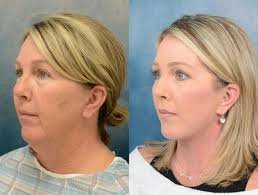A Step-by-Step Breakdown from Consultation to Recovery
The deep plane facelift is a highly advanced facial rejuvenation procedure known for delivering natural, long-lasting results by lifting and repositioning the deeper layers of facial tissue. While the outcomes are often impressive, the process itself involves careful surgical precision, detailed planning, and a structured recovery timeline.
In this comprehensive guide, we break down the entire surgical journey—so medical patients know exactly what to expect at every stage.
🗂️ Overview of the Deep Plane Facelift Procedure
The deep plane facelift goes beneath the SMAS (Superficial Musculoaponeurotic System) layer, allowing the surgeon to lift skin, fat pads, and muscles as a single unit. This deeper repositioning offers:
- A more youthful facial structure
- Better correction of nasolabial folds and jowls
- Longer-lasting results (often 10–15+ years)
- A natural, non-pulled appearance
🧑⚕️ Step 1: The Consultation
The process begins with a comprehensive consultation with a board-certified facial plastic surgeon. During this appointment:
- Your facial anatomy, skin quality, and aging patterns are evaluated
- Your goals and expectations are discussed in detail
- Medical history and medications are reviewed to assess surgical risk
- Before-and-after photos of past patients may be shown to illustrate possible outcomes
💡 Tip: Bring a list of questions and be honest about your goals. A successful outcome starts with clear communication.
🧪 Step 2: Pre-Surgical Preparation
Once you’re deemed a good candidate:
- Lab work or medical clearance may be required (especially if you’re over 50 or have health conditions)
- You’ll receive pre-op instructions, including:
- Stop smoking at least 4–6 weeks before surgery
- Discontinue blood-thinning medications or supplements
- Arrange for transportation and post-op care assistance
- Some surgeons may suggest nutritional support or lymphatic massage to optimize healing
🛏️ Step 3: Day of Surgery
❖ Anesthesia
- Typically performed under general anesthesia or deep IV sedation
- Procedure length ranges from 3 to 5 hours, depending on whether other procedures (e.g., neck lift, blepharoplasty) are combined
❖ Incision Placement
- Carefully placed in natural creases: around the ears, along the hairline, and sometimes under the chin
- These incisions are designed to be discreet and fade over time
❖ Deep Plane Dissection
- Surgeon releases and lifts the SMAS layer and underlying structures as a single unit
- Facial fat pads are repositioned to restore volume
- Skin is gently redraped without excessive tension
❖ Closing the Incisions
- Skin is sutured using fine, tension-free techniques
- Drains may be placed to reduce fluid accumulation (usually removed in 1–2 days)
- A soft compression dressing is applied
⏳ Step 4: Immediate Post-Op and Recovery Timeline
🩹 First 1–3 Days
- Swelling and bruising are at their peak
- Mild to moderate discomfort, tightness, or pressure (usually manageable with pain meds)
- You’ll be advised to:
- Sleep with head elevated
- Avoid bending or heavy lifting
- Stay hydrated and eat soft foods
🕐 Week 1
- Follow-up visit to remove drains and monitor healing
- Bruising and swelling start to decrease
- You may still feel numbness or tightness, which is normal
🕑 Weeks 2–3
- Sutures are typically removed (if not dissolvable)
- Most patients begin light activity or return to remote work
- Makeup can help camouflage residual bruising
🗓️ Weeks 4–6
- Swelling continues to fade
- Facial movement feels more natural
- Social activities and exercise are usually cleared by your surgeon
🧬 Months 3–6
- Final results become visible
- Scars continue to fade
- Any residual tightness or numbness gradually resolves
🧠 Risks & Safety Considerations
While generally safe in experienced hands, risks may include:
- Hematoma (blood accumulation)
- Infection
- Nerve injury (usually temporary if occurs)
- Scarring or skin irregularities
Choosing a surgeon with extensive experience in deep plane facelifts significantly reduces these risks.
✨ What Makes a Successful Surgical Experience?
✔️ Clear communication with your surgeon
✔️ Strict adherence to pre- and post-op instructions
✔️ Patience with healing time and gradual changes
✔️ Choosing a qualified, board-certified facial plastic surgeon
📌 Final Takeaway
The deep plane facelift is one of the most effective and advanced facial rejuvenation techniques available today. Understanding the surgical process—from consultation to full recovery—can help you feel informed, prepared, and confident in your decision.
“This isn’t just about looking younger—it’s about restoring confidence and natural beauty in a way that respects your unique facial identity.”
— Real patient insight




